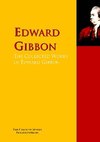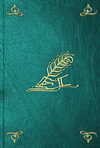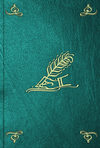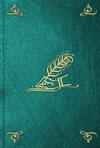Loe raamatut: «Private Letters of Edward Gibbon (1753-1794) Volume 1 (of 2)», lehekülg 20
212.
To J. B. Holroyd, Esq
Bentinck Street, Sept. 14th, 1774.
You must not suppose that I mean to keep up with you this Prussian firing of four times in a minute, a letter every other day. I shall now hold my tongue for some time. Burtenshaw's end I like better than his beginning. Your expedient is excellent, honourable and safe: therefore execute it without delay, and think no more about the whole business. I receive your congratulations; as to consequences, your scheme has the most apparent, mine the most real generosity, but there is not any hurry for either. —Clarke is returned, very indifferent the first day, but now perfectly well, at least for the present. Wilbraham is likewise come up to make some preparations and to buy a little gold chain (vulgo a ring) for his squirrel. Both salute you. – The World may now be in flames when it pleases, provided the Sun fire office be safe; your Man was with me this morning; a very compleat puppy! – Not a word of My Lady! is she quite lively and spleepy? Nor a word about the Journey to town; there never was a more rational proposal, indeed there never was. From My Lady I pass to the cheese. It was divine in every respect but immortality. I fear the season is too far advanced for another – Enquire.
213.
To his Stepmother
Bentinck Street, Sept. 17th, 1774.
Dear Madam,
Without reproaching you for your silence (which would indeed be the height of assurance) give me leave to inform you of a piece of news, with regard to which I am sure you will share my very agreeable feelings. Mr. Eliot has in the most liberal manner assured me a seat in Parliament, an event which changes the colour of my whole future life. After such intelligence I could add nothing but what would be flat and insipid.
I am, Dear Madam,Most truly yours,E. Gibbon.
214.
To J. B. Holroyd, Esq
24th Sept., 1774.
As the matter admitted of no delay, and the paper was anonymous, it went by this morning's coach. Otherwise I am a great friend to County meetings & resolutions to abide by their sense. They form a happy medium between the Juntas of Grandees in town, and the Mob-archy of the rout of freeholders, and preserve the peace of the County without sacrificing its independence. Moreover, I do not comprehend your plot – You are totally in the wrong in not coming to town. Does the Bath journey hold? Mrs. G. grows impatient, but it will most wonderfully delay the fall of the Roman Empire. I gave your holy paper, and reasonable request to Caplin. He graciously promised to consider of it. Clarke is infinitely better, town very lively. Dine next Tuesday at Atwood's with Duke of Portland, &c. Smythe is sensible, for he agrees with me, and I hope September 24th, 1774, has tranquillized you.
215.
To his Stepmother
Bentinck Street, Oct. 4th, 1774.
Dear Madam,
DISSOLUTION AND GENERAL ELECTION.
Last Friday I went down to Sheffield Place at the particular request of Mr. H., to advise with him about a Parliamentary scheme of his own, but which proved impracticable. We then were talking only of next Spring, but the next day I received from Clarke the unexpected intelligence.256 The Sunday I wrote to Mr. Eliot directing my letter into Cornwall, where I supposed him long since arrived, and I now wait impatiently for an answer. As to my journey, it has now become impossible; the election will be over before I can get there. Indeed, as I can have no interest there but his assistance, his presence is alone necessary or useful. However, in my letter I offered to fly. If you will answer for Mr. Eliot's intentions I will answer for his power. His disturbance could arise only from his indolent temper, the surprize and perhaps some little concern about Grampound which does not relate to me. As he is in firm possession, the suddenness of the occasion is at all events more favourable to him than to any concealed or secret enemies. Therefore, I do indeed consider myself as secure. Before his offer, I could contentedly have borne my exclusion, but I could not now support the disappointment, and were it to happen, I would instantly and for ever leave this kingdom. A few days will now determine my fate, and you may depend on the first intelligence of it.
I am, Dear Madam,Ever yours,E. Gibbon.
216.
To J. B. Holroyd, Esq
7th October, 1774.
I do not find that Harcourt has advertised in any of the Papers, and begin to doubt whether he will stand. Yet I wish you would curb your impatience, and adopt my slow and cautious plan. Your visit to Goodwood I cannot thoroughly like, nor do I think that a seat, were it obtainable on those terms, would be any very distinguished honour. As for us, we are all in a hurry with London, Westminster, &c.: but I could not write particulars without copying sheets of lyes from the Papers. – Clarke257 is pretty well at present. He does not go into Derbyshire, and expects, like me, but with more Philosophy, the news of his success. Deyverdun is arrived to-day with his friend Lord M., who I believe is satisfied with his travels. He is with me, and I have nothing more to say. I gave My Lady a little sermon about her un-wellness, which I hope she will profit by and consent to seek for some advice.
217.
To J. B. Holroyd, Esq
October the 10th, 1774.
Since you have broke loose, my cold counsels must be changed into warm wishes, and, as far as my nothingness can extend, into warm actions. Yet my outset may appear careless and dilatory in not writing to you or to the others on Saturday night. Your damned coach kept the parcel all the evening, and it was not delivered to me till yesterday morning, therefore it was impossible to write sooner than to-day. It is very few borderers that Sir Hugh can collect, but I am sure he will do his utmost. I had a proper opportunity of writing to Lady Fetherstone, which I thought was still better than to Lascelles. I have wrote to L. likewise. I am sorry that you have started, but since you have done the deed, I wish you had done it sooner. Sir Thomas258 has now the advantage of time and the show of a nomination. I shall be impatient to hear of your success with the Grandees. The few Elections already over have been conducted (thanks to the Grenvillian Act259) with a sobriety, a chastity and a parsimony unexampled in this venal country. My devoirs to My Lady, and the Cantabs; assure the latter that I much regret my running away from them. After Wednesday I shall hourly expect some Cornish news. Adieu.
Surely M. d'Harcourt uses both the County and his friends very ill in not taking the least notice of either. Do not they grumble? I congratulate you on the prospect of dining with your old acquaintance at the Mansion House.260
218.
To J. B. Holroyd, Esq
October 13th, 1774.
HOLROYD WITHDRAWS HIS CANDIDATURE.
I received this day your two Epistles, the one per post, the other per coach. Your first was perfectly clear, and convinced of what you repeat in the second, that an honourable retreat is your only resource. Yet even that is difficult. What can you say? that you decline for the peace of the County? You advertised against a declared Candidate. Personal respect for Sir T[homas] W[ilson]? Do you owe him any compliment? Besides you cannot approve of him without betraying the honour of the East. It is much easier to advance than to retire, because you never can give the true reason of a retreat. Suppose you only say – To the Gentlemen, &c. "The Encouragement I have received from my numerous friends deserves and claims my warmest acknowledgements, but the powerful interest already formed in the Western part of the County and in the neighbourhood of the place of Election induces me to spare them the trouble of so long and probably so useless a journey.
I am, &c.,J. B. Holroyd."
It is nonsense, but I see no better nonsense you have to write. I wish you had never begun it. Remember my old slow plan. It is now more likely to succeed than ever.
I am now in constant expectation of hearing from Cornwall. Adieu. Duane has thoroughly opposed my great tythes.
E. G.
219.
To J. B. Holroyd, Esq
October the 14th, 1774.
I am sure you have generosity enough to hear with pleasure the news which I have just received, that I am elected Member of Parliament for Liskeard.
E. G.
Franks do not take place till the 20th.
220.
To his Stepmother
Bentinck Street, October 15th, 1774.
Dear Madam,
I fancy Mrs. Eliot has already conveyed to you the pleasing intelligence which I received to-day, that I am elected Member for Liskeard.
I am,Ever yours,E. G.
The right of franking does not commence till the 20th.
221.
To J. B. Holroyd, Esq
Boodle's, October the 22nd, 1774.
A VISIT TO BATH.
By this time I suppose your Election over, and would bet two to one that Sir James261 has carried it, – a lucky circumstance for you; he will fill the place, and some years hence, when you have shaken off the novus homo, you may assert the liberty of the East. – You are now quiet, and I want to hear about the Bath scheme. Amusement, Piety, Health all recommend it; and I think that with the opening of next month you and My Lady should find yourselves in Bentinck Street, stay two or three days for consultations, purchases, &c., and then set out for Bath, which will allow me a clear fortnight there before I am summoned to town. I want a speedy answer about your plan.
Duane's opinion has been sent, but with very little effect. Lovegrove is at Bristol, I believe dying – Matthews shuffles as usual. I have directed a very clear, peremptory Epistle – Hugonin was much disposed for you, and even Sir Harry, if I may trust a letter from his Mama. Adieu. I do not like My Lady, and think that on her account you should come up directly.
Shall I order the Papers to be directed to me at S. P.?
222.
To his Stepmother
Bentinck Street, October the 29th, 1774.
Dear Madam,
You know I am never fond of long letters, and the less so when I have the near prospect of seeing you very soon. About the middle of the week after next, that is, about the 8th or 9th of November, Mrs. Porten and myself propose getting into my chaise, and, lying one night on the road, to arrive the second day in New Charles Street. My aunt is well at present and in vast spirits on the occasion. As my time is now circumscribed I should have set out sooner, were I not detained by some circumstances relative to the Holroyds. They have left me this morning after a short stay of only two nights in town. You will not alarm the family at Bath, but I really think her very far from well.
I am, Dear Madam,Most truly yours,E. Gibbon.
223.
To J. B. Holroyd, Esq
Bond Street, November 3rd, 1774.
Though I have nothing to say, I must write two lines to say what you know already, how truly I sympathise with you. I hope at last Mrs. H. will hear with patience of Bath, and of the cold Bath. I am sure the latter (for air, exercise, and gentle amusement) would be of infinite service to her. My time as you see is so strictly defined, that I cannot wait longer than Thursday next. Deyverdun goes with us, and Clarke, who is advised to try the waters, will possibly follow us. Both desire to be named to you. My compliments to the Lady Cambridges; and many thanks to my fair Guest in particular. Next Monday I visit Twickenham.
O rare Sir Thomas Wilson! Adieu.
E. G.
224.
To his Stepmother
Bentinck Street, Nov. 5th, 1774.
Dear Madam,
Next Wednesday Mrs. P. and myself start from town, and hope to enjoy the pleasure of drinking Tea in Charles Street on Thursday. Deyverdun, who is returned to England with Lord Middleton, means to be of the party: that is to say he will get into the machine, when we mount the chaise, and will keep company with us in the journey. We mean to live with you and upon you, but as Mrs. P. is large and your house is small, I should think, if you procured us two bed-chambers and a dining-room in the neighbourhood of Charles Street, we should have more room to swing a cat. However, I submit every arrangement to your wise Counsels, and am,
Dear Madam, ever yours,E. G.
225.
To J. B. Holroyd, Esq
Spinham lands, Nov. 9th, 1774.
ANXIETY FOR MRS HOLROYD.
I am not a little uneasy in not hearing either Monday or Tuesday from S. P. Is Mrs. H. worse either in health or spirits? Has she tryed the Cold bath, or does she at least hear the sound of it with less reluctance? I am still of opinion that Bath in every respect would be the best place for her to make some stay in, and if my intreaties or authority could have any weight, I would wish you to give them their full force. I am now (Mrs. Porten and Deyverdun are with me) above half-way on my journey. As your father is infirm and sister a female, shall I secure you a Lodging, &c.? By this time I suppose Sir Thomas is Knight of Sussex. Cedat fortunæ Ratio. Adieu.
My Compliments to the Ladies Cambridge. I have used their Parent like a Dog; but it was unavoidable.
226.
To J. B. Holroyd, Esq
Bath, Nov. 13th, 1774.
I arrived at Bath, Thursday night, and saw the Pater and Sorella262 the next morning: the former in my opinion surprizingly well. They gave me very satisfactory information as to health and designs. If you really arrive the eighteenth, we shall have one week together in this enchanted spot, where the Goddess of Pleasure is supposed, by the vulgar, to hold her Court. You may possibly see Guise, but I fear Clarke will not be prevailed on to leave Town. I have most strongly pressed him, and I think you will call on him in your passage, wherein I suppose of course you will lodge in Bentinck Street. I conclude: my coffee-house materials are most vile, and I hope this will not find you at Sheffield. My fellow travellers, Aunt and Deyverdun, are well, and Mrs. G. has almost choaked us with kindness and good things. Adieu.
E. G.
227.
To J. B. Holroyd, Esq
Nov. 29th, 1774.
All safe and well. I am just returned from the Cock-pit. The K.'s speech vigorous with regard to America.263 Our address a loyal Echo.
I have talked with Barré about Tremlet, he is an intimate friend both of the Colonel and of Dunning, and they think him equal to all his Bath Atchievments. – Lord Clive264 certainly cut the jugular vein with a pen knife – it is called a feaver frenzy. To-morrow we are sworn in, and the amiable virtues of Sir Fletcher265 will most assuredly procure him a Unanimity. I hope Bath still agrees with My Lady. I wish I could send you a favourable account of poor Clarke, but he is really very bad; his looks more shocking than ever, neither strength, rest nor appetite. Dr. Addington, his Physician, hopes his liver is not touched, but thinks him in one of the worst habits of body he ever saw, – his complaint bilious and obstructions of the bowels; dreads an inflammation. It is a melancholy subject.
Adieu. See Mrs. G.
228.
To his Stepmother
Boodle's, Nov. 29th, 1774.
Dear Madam,
Our journey was successful and agreeable. Mrs. P. arrived in town perfectly well, and, I believe, writes to you by this post. This morning I took my seat, and found it in every respect an easy one. Poor Clarke is extremely ill, and I fear there is very great if not immediate danger. His present physician is Dr. Addington, with whom I am very much pleased. As to Bath, it would be impossible to transport him.
I am, Dear Madam,Most truly yours,E. Gibbon.
229.
To J. B. Holroyd, Esq
Bentinck Street, December 2nd, 1774.
ILLNESS OF HIS FRIEND CLARKE.
I wish I could speak more favourably of poor Clarke, but I much fear that there is very little hope. It is in vain to enquire whether his complaint is bilious, that is a very soft word; but his situation is as bad as you can conceive. Dr. Addington (whose skill is I believe equal to his humanity), as well as his very sensible Apothecary, seems only undetermined between the fear of a short fit or a long palsy. His Constitution is broke up. He has been persuaded to think of a settlement which may save a noble Estate from the hands of an idiot Brother, and Skipwith and myself are to be Trustees; painful and ungrateful office, yet there is not a moment to be lost.
*I send you inclosed a dismal letter from Hugonin. Return it without delay, with observations. A Manifesto has been sent to Lovegrove, which must, I think, produce immediate peace or war. Adieu. We shall have a warm day on the Address next Monday. A number of young Members! Whitshed,266 a dry Man, assured me, that he heard one of them ask, whether the King always sat in that Chair, pointing to the Speaker's.* I embrace My Lady. Deyverdun thanks and salutes.
E. G.
Sackville Street complained yesterday of silence.
230.
To J. B. Holroyd, Esq
December, 1774.
Poor Clarke is too melancholy a subject to dwell much upon. Had I wrote last night I should have said that symptoms appeared rather more favourable, but I must now have contradicted myself. I fear there remains but little hope. If I have any really good news to send you I will not lose a moment. Otherwise permit me to be silent on that unpleasant head.
Monday last was our first engagement. You have seen the Address,267 Lord John Cavendish's amendment, and the numbers – 264 to 73. Burke was a water-mill of words and images; Barré an Actor equal to Garrick; Wedderbourne artful and able. Lord G. Germaine, though An Anti-American, remained silent; Hartley,268 Sir William Maine269 and some other new Members lost their maidenheads with very little credit. Once or twice I was a little lewd, but am now well pleased that I resisted the premature temptation. I divided with the Majority. Your Lewes friend Sir Thomas270 (to the general surprize) with the minority.
As to private affairs, It is a strange pair of brutes that I an engaged with. I send your letters as instructions to Hugonin. As to Lovegrove we expect his Ultimatum. The Bishop of Landaff gives a very bad character of Matthews.
Last Tuesday I dined at Lethiuellier's271 with Maudit,272 Lascelles and Sir Thomas Millar. Next Tuesday they dine in Bentinck Street, with the addition of Batt.273 From some circumstance it appears that my romantic attack on Lord A. might have succeeded. Adieu.
Embrace my Lady. The treaty between moles and paper is far advanced.
231.
To Mrs. Holroyd
Bentinck Street, Dec. 17th, 1774.
Dear Madam,
A GOOD SON AND A GOOD FRIEND.
With regard to my silence, poor Clarke is too good and too melancholy an excuse. I know not what to say about him; he is reduced to nothing, and his disorder is attended with every bad symptom. Yet his Physicians – Addington and Thomas – are on the whole less desponding than they were some days ago.
Surely no affair was ever put into better hands than mine has been. Your skill and friendship I am not surprized at, but Mrs. Porten is a most excellent procuress, and The Lady Mother has given as proper an answer as could be expected. There is only one part of it which distresses me, Religion. It operates doubly, as a present obstacle and a future inconvenience. Your evasion was very able, but will not prudence as well as honour require us being more explicit in the suite? Ought I to give them room to think that I should patiently conform to family prayers and Bishop Hooper's Sermons? I would not marry an Empress on those conditions. I abhor a Devotee, though a friend both to decency and toleration. However, my interests are under your care, and if you think that no more need be said on the awkward subject, I shall acquiesce.
After all, what occasion is there to enquire into my profession of faith? It is surely much more to the purpose for them to ask how I have already acted in life, whether as a good son, a good friend, whether I game, drink, &c. You know I never practised the one, and in spite of my old Dorsetshire character, I have left off the other. You once mentioned Miss F. I give you my honour, that I have not either with her or any other woman, any connection that could alarm a wife. With regard to fortune Mrs. P. speaks in a very liberal manner; but above all things, I think it should not be magnified. If it should be necessary to hint at incumbrances, your delicacy I am sure could place them in such a light as might raise the character of the living without injuring the memory of the dead. You see how serious I am in this business. If the general idea should not startle Miss, the next consultation would be how, and where the Lover may throw himself at her feet, contemplate her charms, and study her character. After that we may proceed to other more minute enquiries and arrangements.
Mrs. Porten knows she was blind. Her brother is married. – How go on your Civil Wars? Next week Foote and Coleman will be with you. Adieu.
Dear Madam,Most truly yours,Benedict Gibbon.
Excuse me to Holroyd for a post or two.
Parliament was dissolved on September 30, "six months before its natural death… The chief motive is supposed to be the ugly state of North America, and the effects that a cross winter might have on the next elections" (Walpole to Mann, October 6, 1774). The result of the elections was, on the whole, favourable to Lord North.
[Закрыть]
Lord G. Cavendish and Godfrey Bagnal Clarke were elected members for Derbyshire.
[Закрыть]
Sir Thomas Spencer Wilson, with Lord G. H. Lennox, was returned for Sussex.
[Закрыть]
On March 7, 1770, a Bill for regulating the proceedings of the House of Commons on controverted elections was introduced, and became law in April, 1770. It was subsequently known as the Grenville Act, from its chief supporter, George Grenville. The decision of controverted elections was under the Act transferred from the committee of the whole House to a select committee specially chosen for each case. Originally passed for five years, it was made perpetual in 1774.
[Закрыть]
John Wilkes was elected Lord Mayor, October 8, 1774.
[Закрыть]
Sir James Peachy, Bart., was bottom of the poll for Sussex.
[Закрыть]
I.e. Mr. Isaac Holroyd and Miss Sarah Holroyd.
[Закрыть]
The new Parliament met November 29, 1774.
[Закрыть]
Lord Clive died November 22, 1774.
[Закрыть]
Sir Fletcher Norton was re-elected speaker, November 29, 1774.
[Закрыть]
James Whitshed, M.P. for Cirencester.
[Закрыть]
The Address was carried on December 5, 1774. An amendment, claiming the fullest information on American affairs, was moved in the Lower House by Lord John Cavendish.
[Закрыть]
David Hartley, M.P. for Kingston-upon-Hull.
[Закрыть]
Sir W. Maine, Bart., of Gatton Park, Surrey, M.P. for Canterbury.
[Закрыть]
Sir Thomas Miller, Bart., of Chichester, M.P. for Lewes.
[Закрыть]
Benjamin Lethieullier, at this time M.P. for Andover, whom Gibbon met at Up Park in 1762, was brother to Lady Featherstonhaugh, and a relation of Smart Lethieullier, the antiquary.
[Закрыть]
Israel Mauduit, pamphleteer and woollen-draper, best known for his Considerations on the Present German War (1760), was agent for Massachusetts Bay. It was on his application that Wedderburn was heard before the Privy Council, in answer to the petition for the recall of Hutchinson and Oliver.
[Закрыть]
"Lawyer Batt," whose name often occurs in these letters, was John Thomas Batt, of Newhall near Salisbury, successively a Master in Chancery, and a Commissioner for the auditing of the Public Accounts. He was a "prime favourite" of Miss Burney, and a friend of Walpole, Lord Malmsbury, and Sir J. Reynolds.
[Закрыть]



















